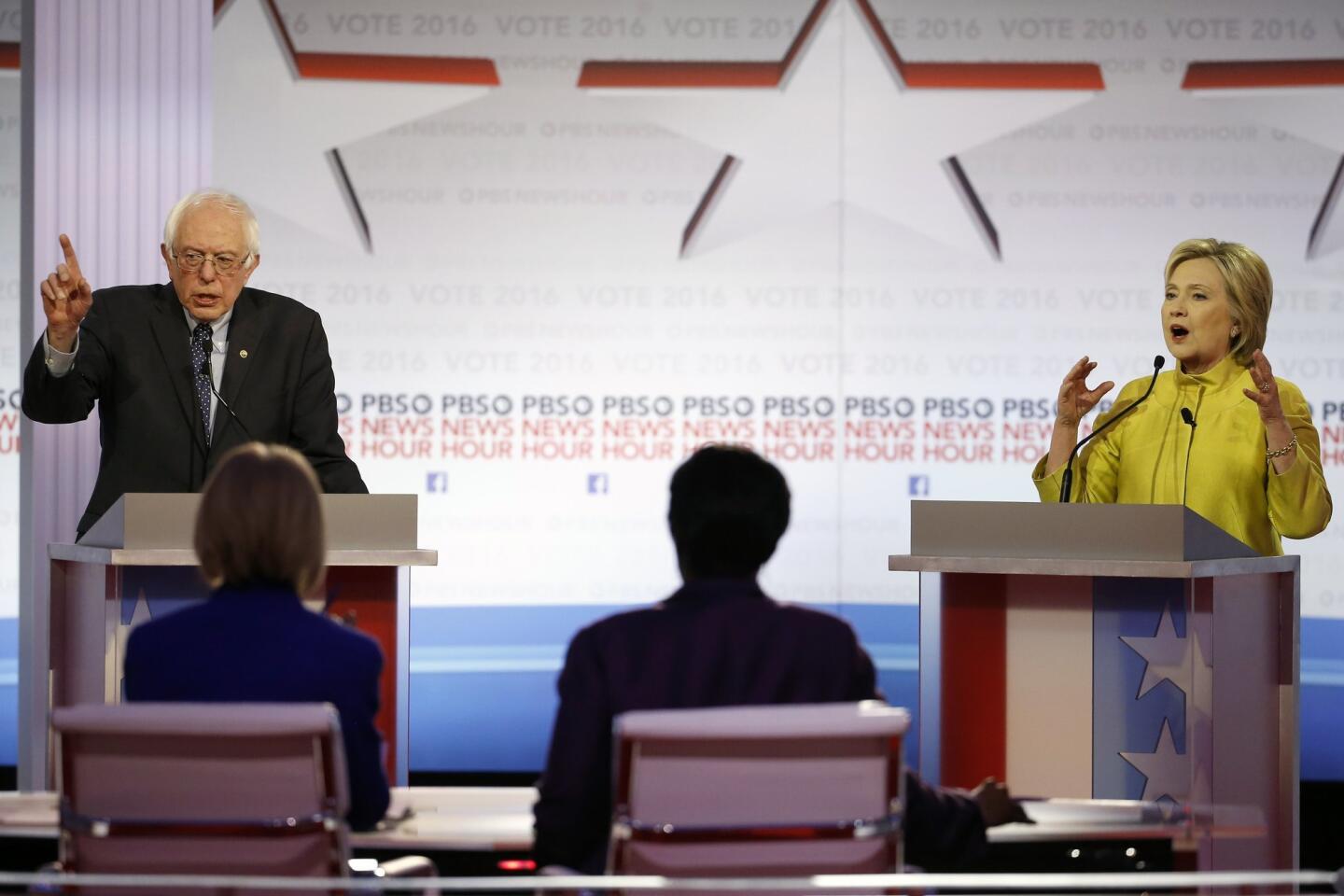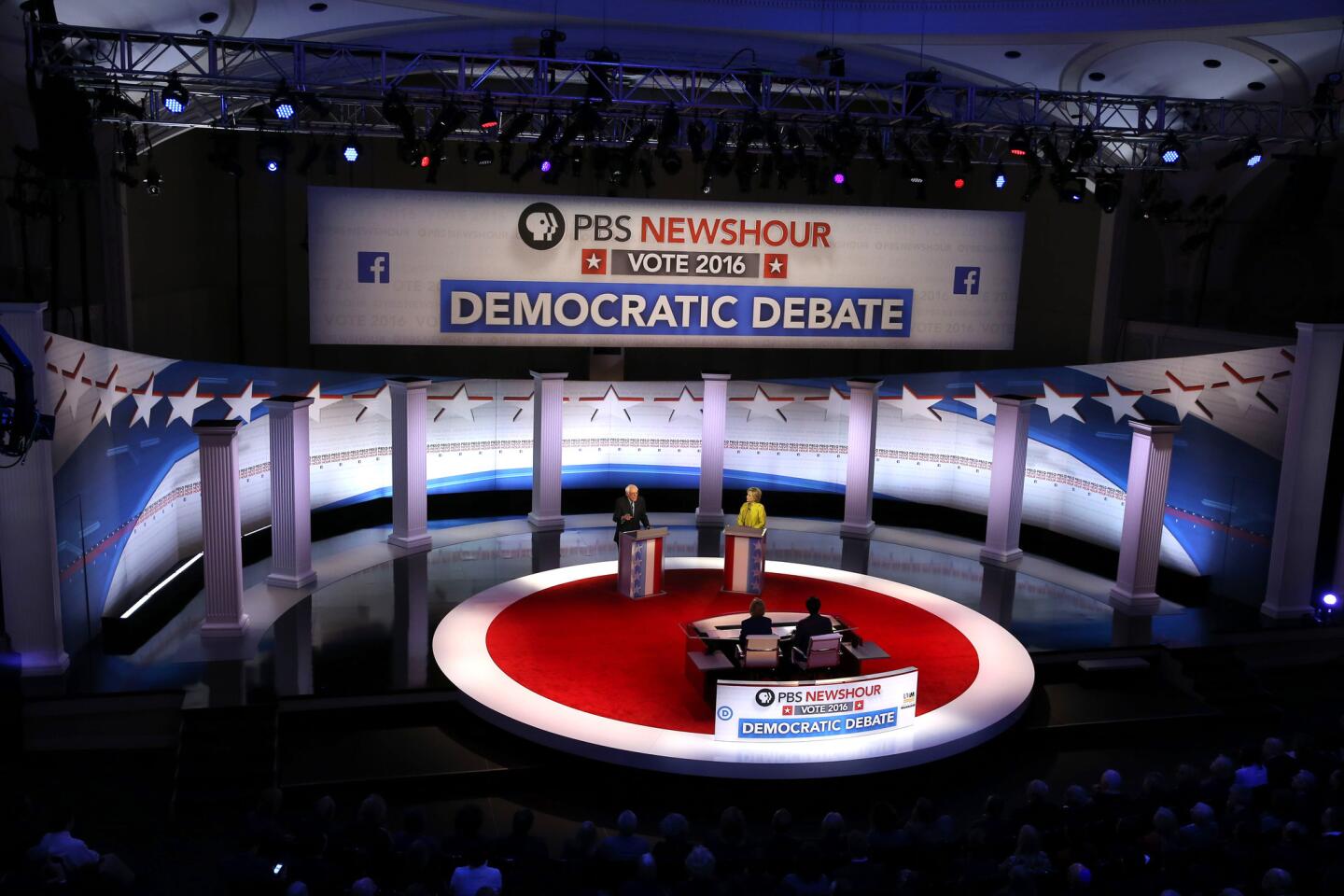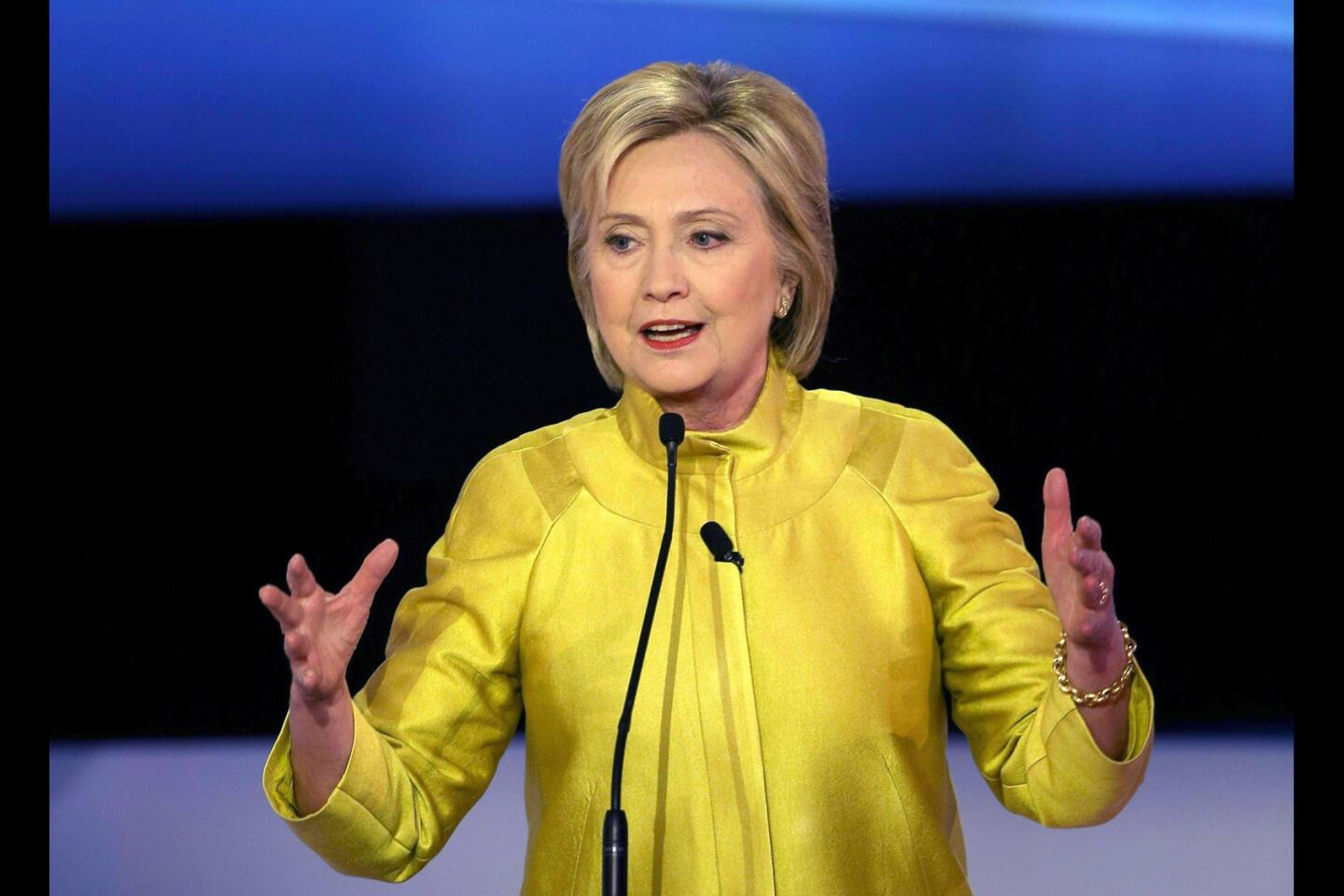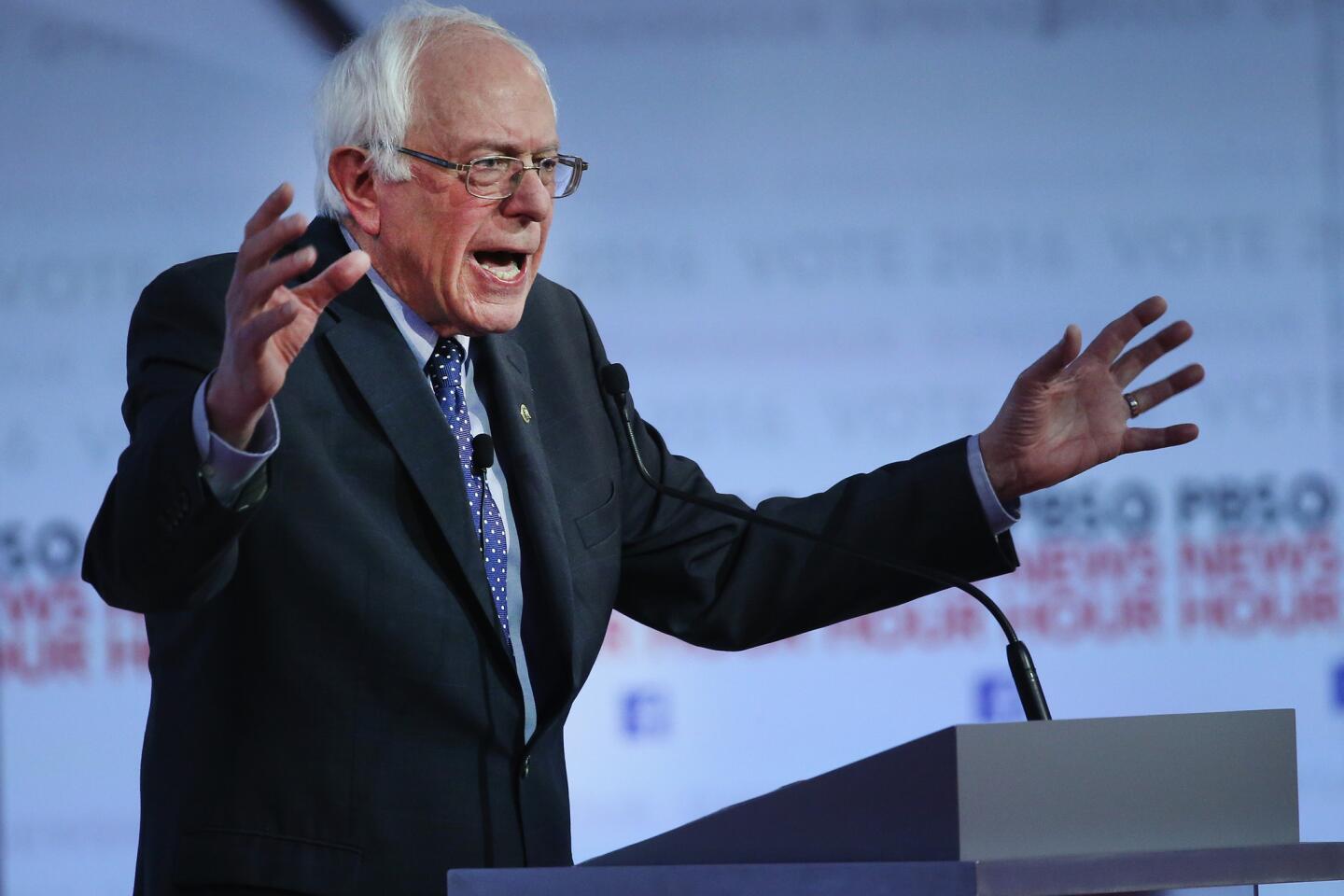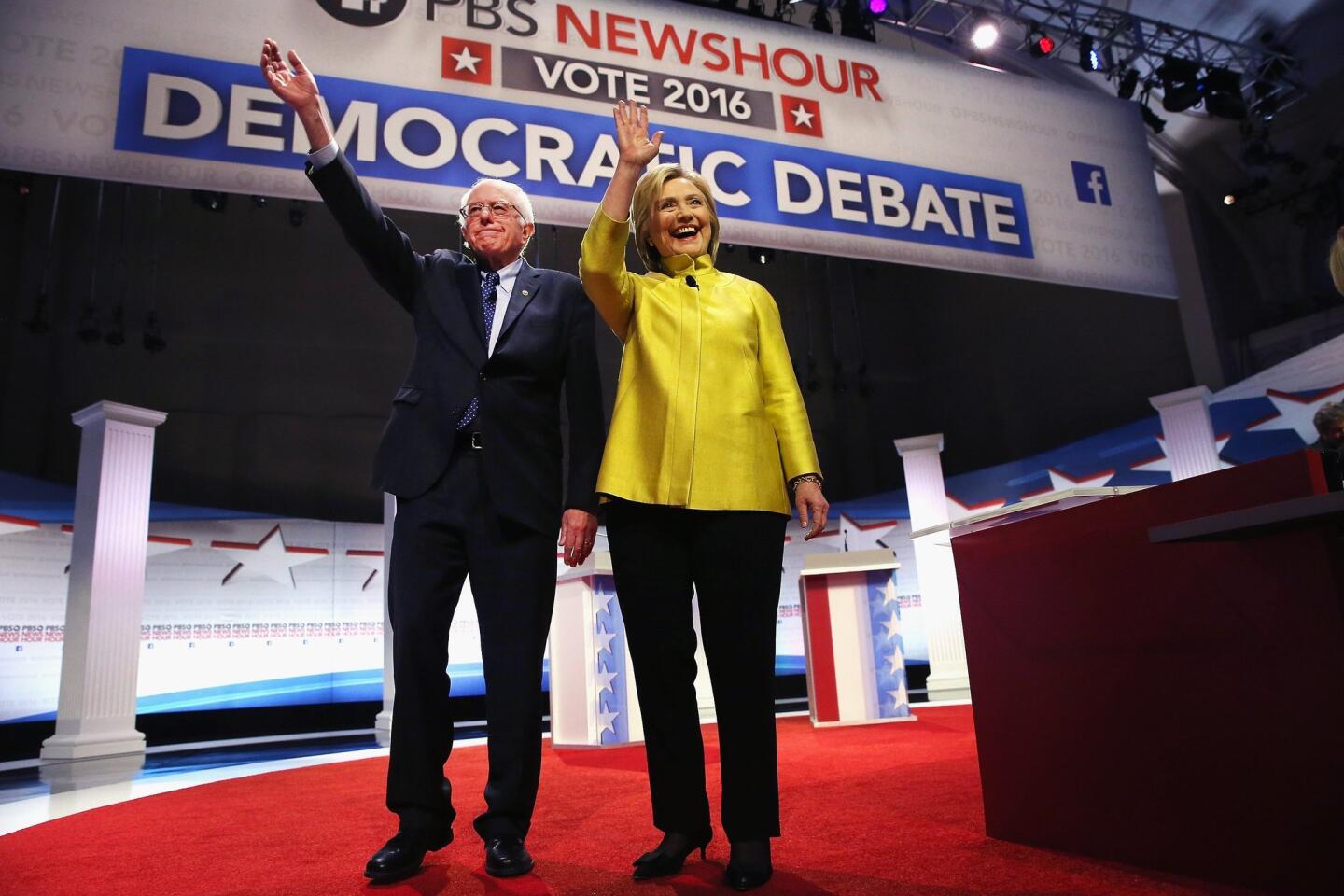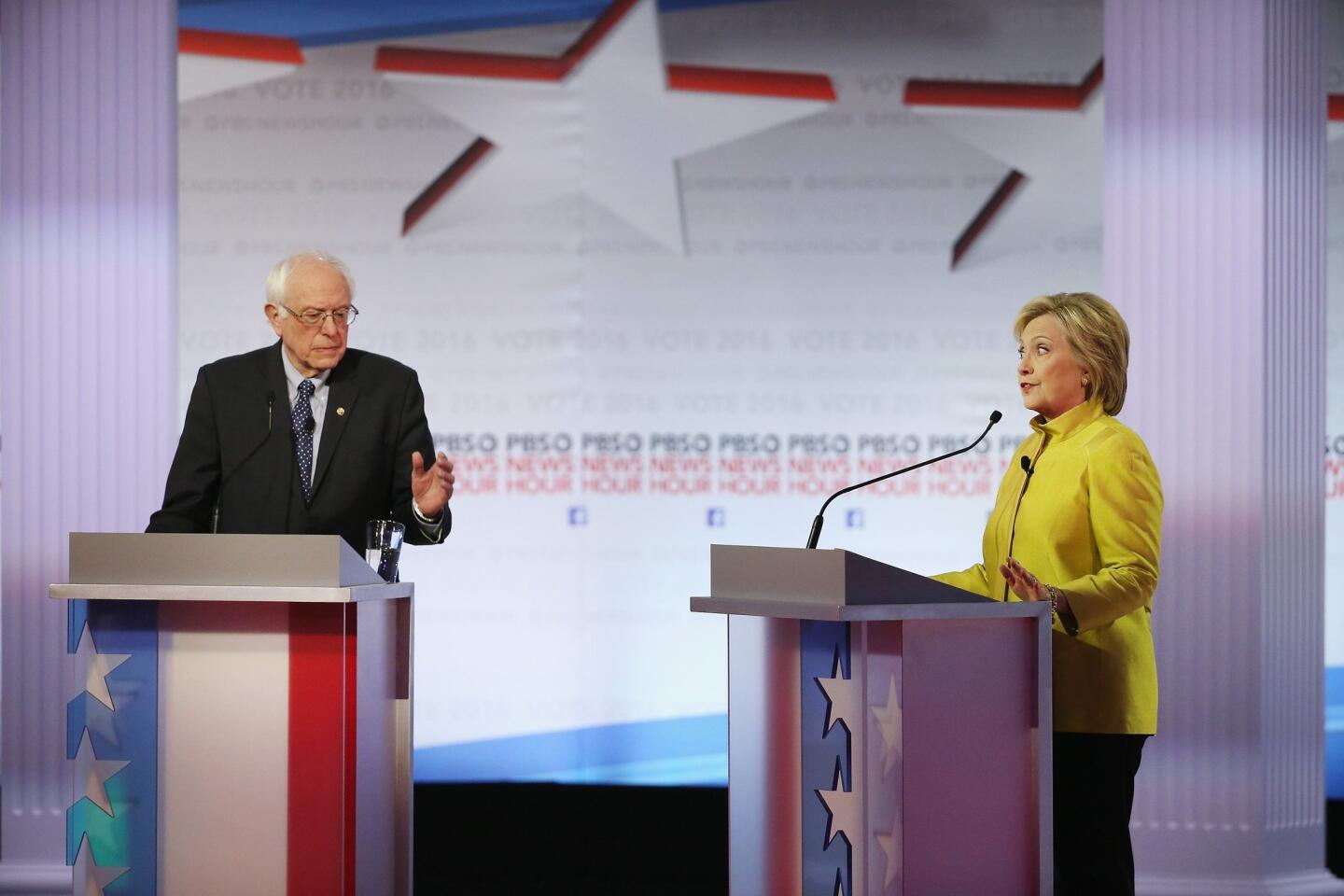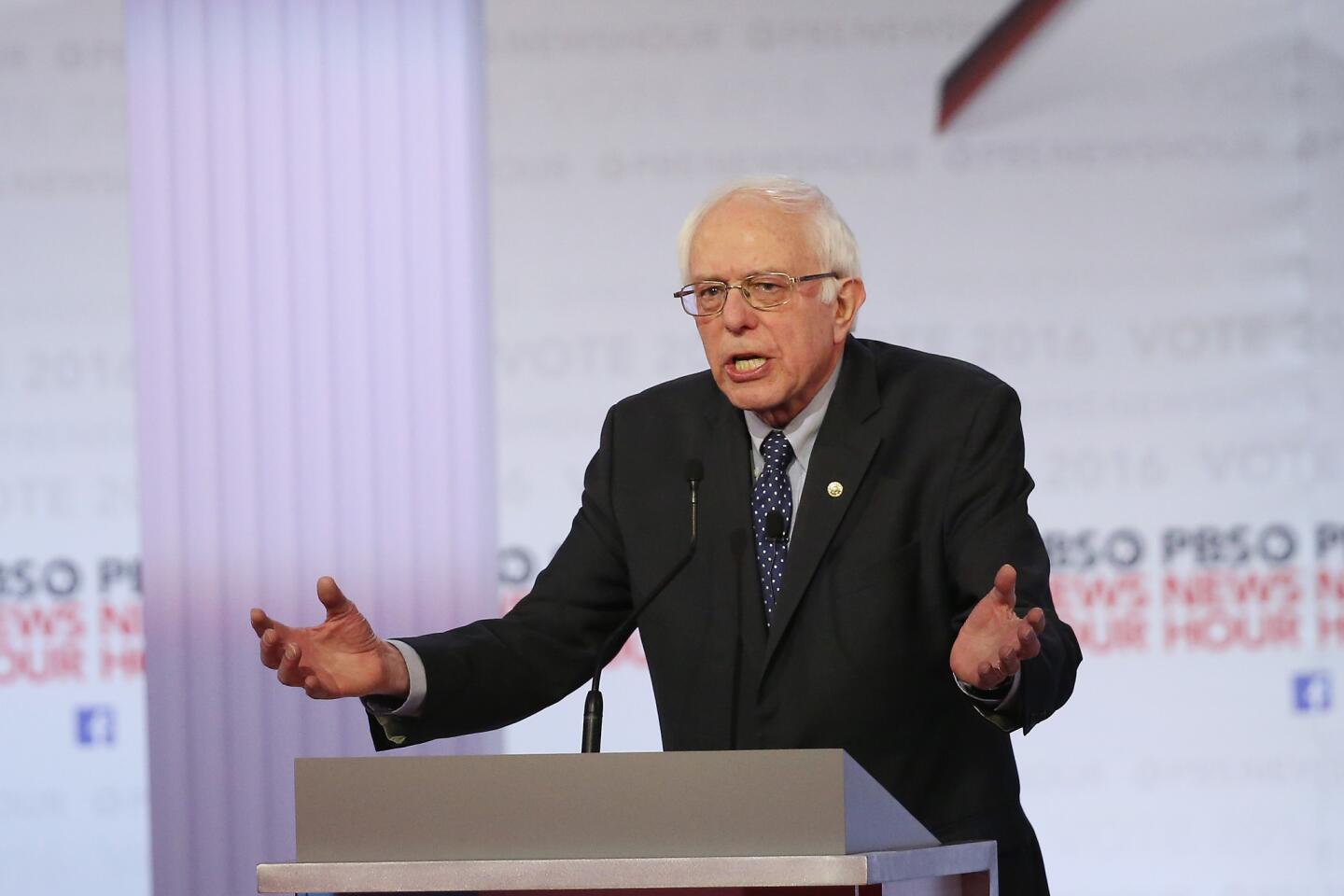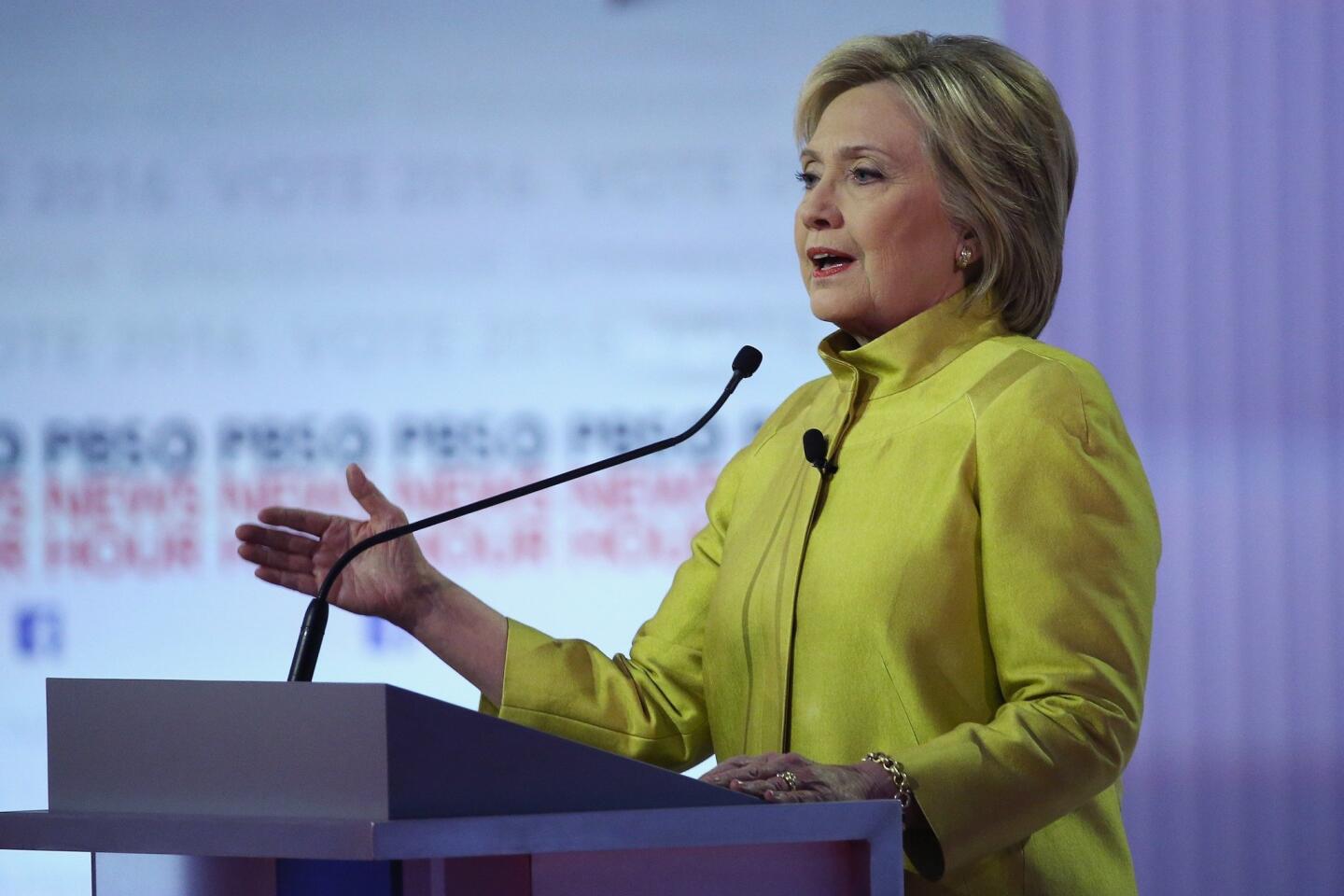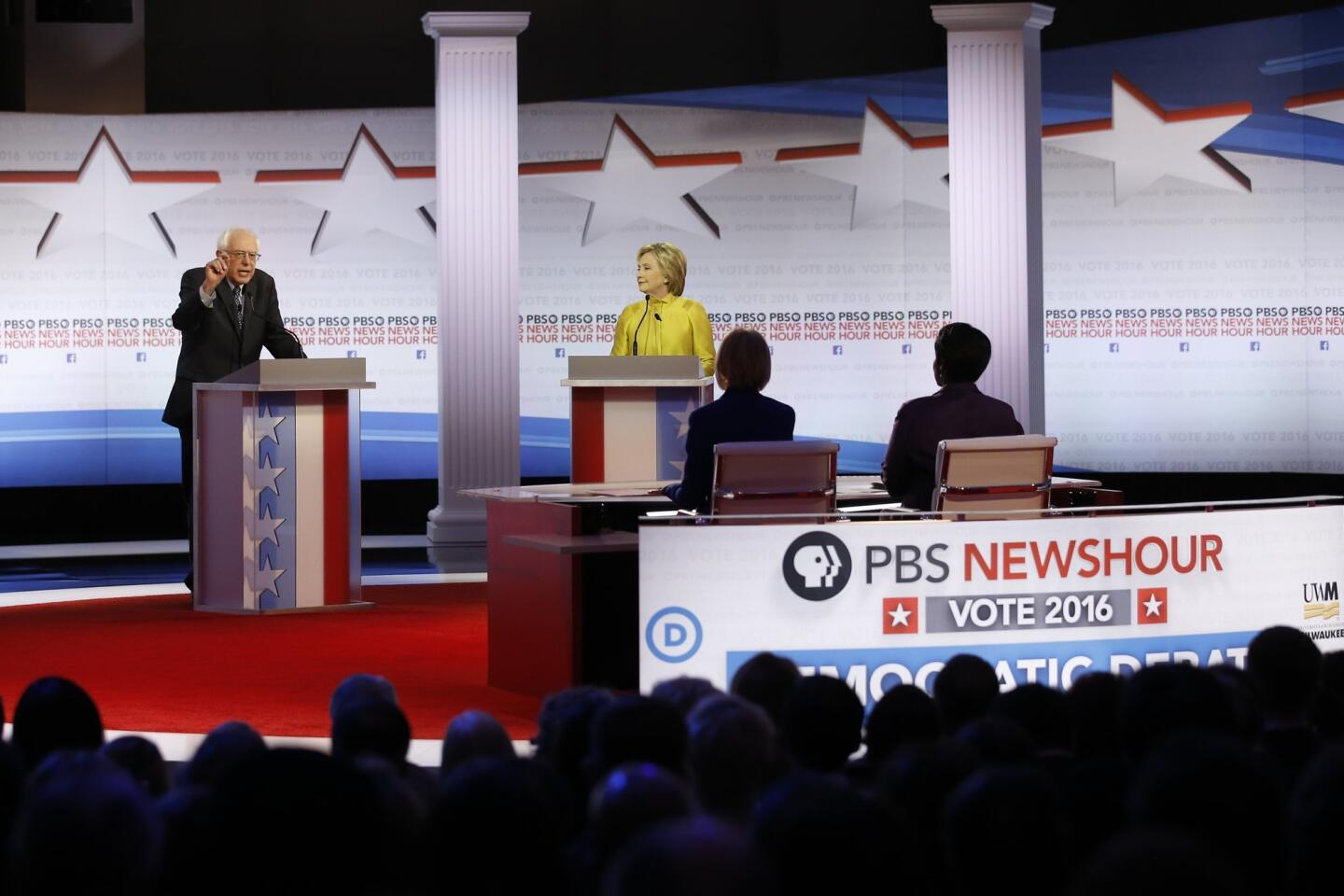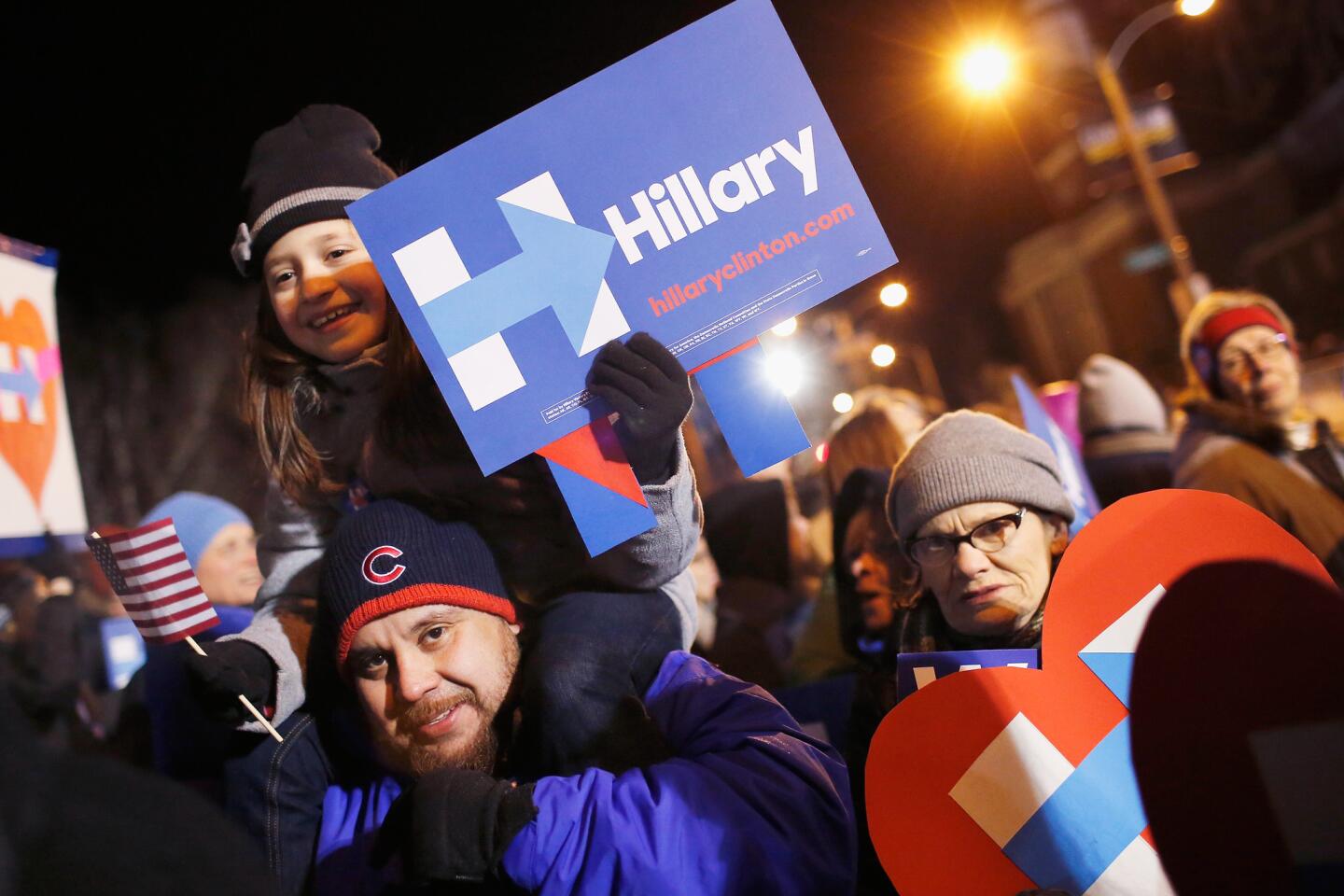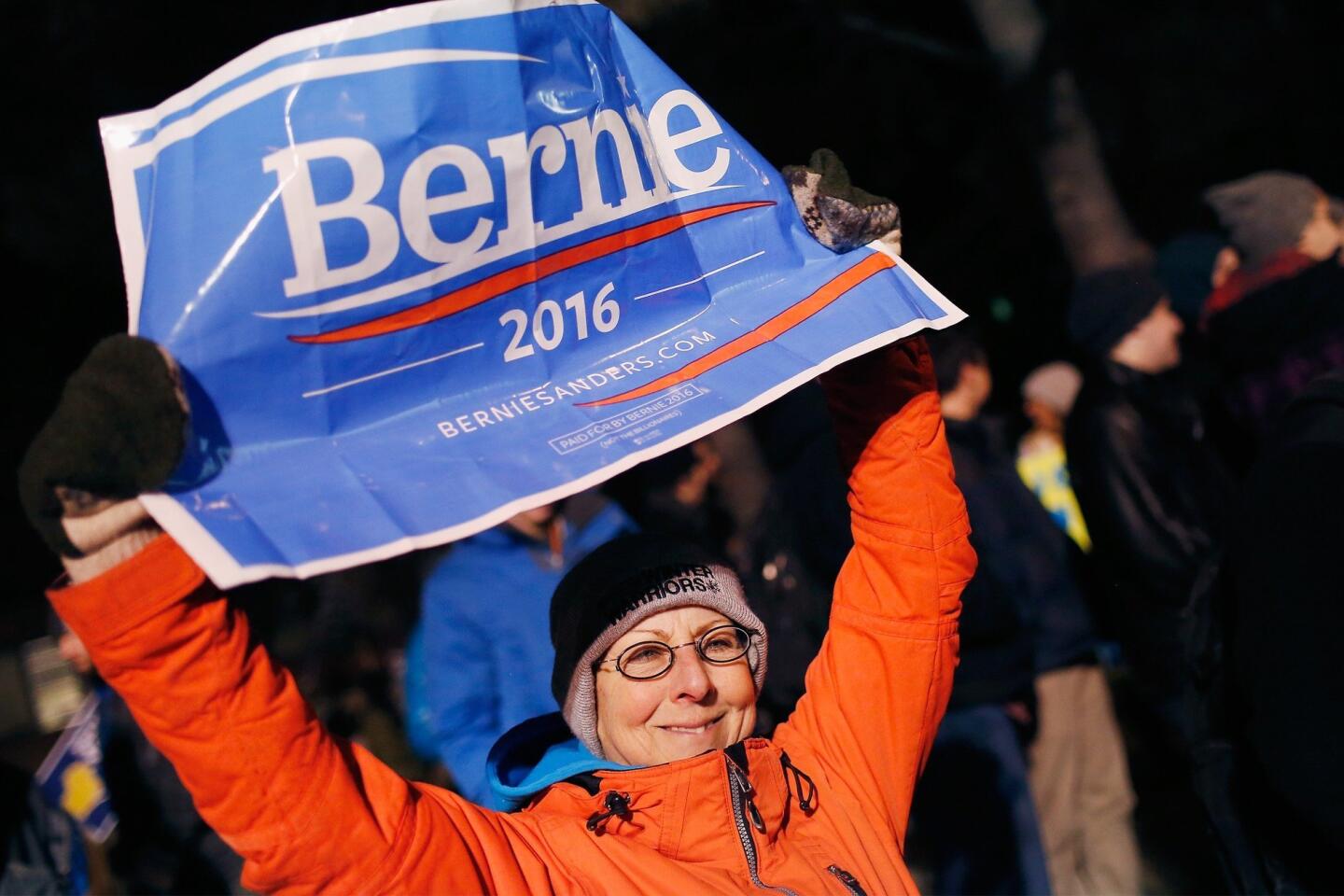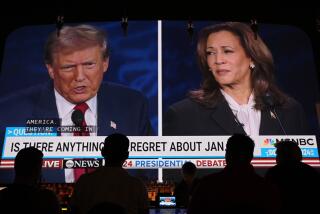Hillary Clinton mentioned Obama 21 times in her debate against Bernie Sanders
reporting from milwaukee — Days removed from her humbling defeat in New Hampshire, and with the campaign moving into states with large populations of minority voters, Hillary Clinton sought to reboot her candidacy in a nationally televised Democratic debate Thursday night by closely aligning herself with President Obama and charging that her opponent is running on a one-note agenda.
A calm, measured Clinton mentioned Obama’s name 21 times during the two-hour debate. She chastised Sen. Bernie Sanders for criticizing Obama in language she said a Republican might use. And she tried to move past the Wall Street ties that have become the albatross of her campaign by warning voters that cleaning up campaign finance alone won’t fix the country.
But Clinton’s arguments were met with feisty rebuttals by her resilient 74-year-old rival, who was not about to yield the momentum generated by Tuesday night’s victory in the New Hampshire primary. Sanders covered little new ground at the debate, sticking to the populist themes that have served him well so far, painting Clinton as part of a tired political establishment too tied to special interests to upend an economy rigged against the middle class.
The volleys began early as Clinton ripped into Sanders’ agenda, charging that he would expand the size of the federal government by 40%. She demanded that he “level with the American people” about the true cost of his plans.
As a bookend, Clinton returned to the attack at the debate’s end, questioning her rival’s loyalty to Obama. She accused him of having called the president “weak” and “a disappointment” and highlighted a blurb Sanders wrote in praise of a book about Obama’s presidency called “Buyer’s Remorse.”
“Madame Secretary, that is a low blow,” Sanders hissed in response.
“I have worked with President Obama for the last seven years,” he said. “We have made enormous progress. But you know what? Last I heard we lived in a democratic society. Last I heard a United States senator had the right to disagree with the president, including a president who’s done such an extraordinary job. So I have voiced criticisms, you’re right.”
The exchange highlighted the much greater role to be played by minority voters, among whom Obama is extremely popular, in the next several rounds of Democratic primaries.
The candidates also engaged in their most contentious exchanges to date on foreign policy.
Clinton has long touted her experience as secretary of State as preparation to serve as commander in chief, while Sanders repeatedly has cited his House vote in 2002 against authorizing the Iraq war — noting that then-Sen. Clinton voted in favor — as an example of his superior judgment.
On Thursday, Sanders expanded that criticism, saying that the administration’s action to remove Libyan leader Moammar Kadafi from power — a course championed by Clinton — had created a power vacuum that has now been filled by the Islamic State militant group.
As president, Sanders vowed, he would “look very carefully about unintended consequences” before taking military action.
Clinton responded by saying Sanders had supported a Senate resolution that backed the administration’s Libya policy, and she sought to undermine his argument that his vote against the Iraq war demonstrates a better grasp of world affairs.
“I do not believe a vote in 2002 is a plan to defeat ISIS in 2016,” she said, using an acronym for Islamic State.
Clinton also referred to a recent interview in which Sanders could not identify whom he consults for advice on foreign policy. The independent Vermont senator responded by citing her praise for Henry Kissinger, secretary of State in the Nixon and Ford administrations, whom he called “one of the most destructive secretaries of State in modern history.”
“I am proud to say Henry Kissinger is not my friend,” he said. “Count me as somebody who will not be listening to Henry Kissinger.”
The tough exchanges underscored how much the race has changed after Sanders’ big victory Tuesday. Clinton now faces a very real threat that she may not win her party’s nomination.
Sanders’ 22-percentage-point rout was a wake-up call to the Clinton campaign. It put Sanders in position to compete in states Clinton had appeared to own, including Nevada and South Carolina — the next nominating contests.
Clinton acknowledged one aspect of her New Hampshire defeat, her struggle to win over female voters, particularly younger women.
“I have no argument with anyone making up her mind about who to support,” Clinton said. “I just hope that by the end of this campaign there will be a lot more supporting me.”
One major reason for Sanders’ success has been the response by liberal voters to his message that the political system has been corrupted by big-money contributions. It is an issue that repeatedly has put Clinton on the defensive, which was where she again found herself when discussion turned to the millions of dollars in support she has received from Wall Street.
Asked about the mammoth pro-Clinton super PAC called Priorities USA, which is run by longtime Clinton friends and advisors, she tried to distance herself from it.
“It’s not my PAC,” she said, making the case that the organization, which operates independently from her campaign, also had supported Obama.
She added that Obama had taken record amounts of Wall Street cash but stood up to the financial industry nonetheless, as she vowed she would do.
“Let’s not insult the intelligence of the American people,” Sanders replied. “People aren’t dumb. Why in God’s name does Wall Street make huge campaign contributions? I guess just for the fun of it they want to throw money around.”
While Clinton defended herself on financial contributions, Sanders sought to rebut her charge that his healthcare plan would undermine the Affordable Care Act, Obama’s signature domestic achievement. The Vermonter’s life’s work, he said, has been dedicated to ensuring healthcare was “a right for all people.”
But Clinton contended that her vision for building on the president’s healthcare law, paid for by raising taxes on the wealthy and closing loopholes, was more politically viable.
“Once I’m in the White House, we will have enough political capital to do that,” she said.
“Secretary Clinton, you’re not in the White House yet,” Sanders shot back.
Both used their opening statements to address issues of concern to minority voters, particularly African Americans, who make up a majority of Democratic voters in South Carolina.
Clinton noted that her first speech of the campaign was on criminal justice reform, while Sanders referred to “a broken criminal justice system.”
Leading up to the debate, Clinton’s campaign had attacked Sanders as a Johnny-come-lately on civil rights issues, saying Clinton was on the front lines of major fights while Sanders was at best an obscure backbencher.
She took a more diplomatic approach on the stage. “What we have to do is build on an honest conversation about where we go next,” she said.
Sanders brought the conversation back to Wall Street, lamenting how it damaged the economy, and how blacks and Latinos “were hit especially hard.”
Clinton returned in her closing statement to Sanders’ continual refrain that sweeping money out of politics would help solve the other problems the country faces. She said she agreed with Sanders on the need to get big money out of politics, but added, “I am not a single-issue candidate.”
Times staff writer Cathleen Decker in Milwaukee contributed to this report. Halper and Memoli reported from Washington.
For more on the Democratic campaign, follow @evanhalper and @mikememoli
ALSO
Live Democratic debate updates
New Hampshire exit polls signal vulnerability for Clinton
Black votes matter as Democratic race shifts to more diverse states
More to Read
Get the L.A. Times Politics newsletter
Deeply reported insights into legislation, politics and policy from Sacramento, Washington and beyond. In your inbox three times per week.
You may occasionally receive promotional content from the Los Angeles Times.
